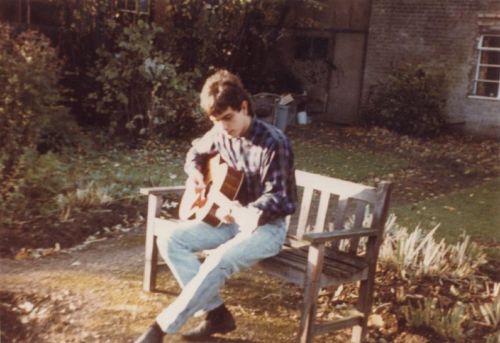Roger
Keith "Syd"
Barret (6 January 1946 - 7 July 2006)
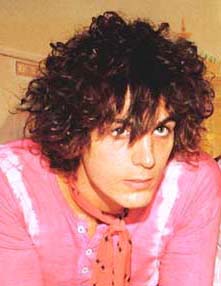
The Early Years
Roger Keith Barrett was born
in Glisson Road, Cambridge, to Winifred and
Arthur Barrett, on January 6th, 1946.
From an early age, he
displayed a musical and artistic nature, and
played the ukulele, the banjo, and piano, he won a prize for a piano
duet at the tender age of seven. He then took up the guitar.
As
he built on his guitar skills, in his exploration of music, in in may different styles. He used to go,
to the Riverside Jazz Club, where
a drummer by the name of "Sid Barrett"
used to play. It was during one of his visits the young Roger Barrett,
got the name "Syd" spelt with a "Y" a name which stuck.
With
his growing musical talents, he played in various bands in
Cambridge and London - bands such as Geoff Mott and The Mottoes, Those
Without, The Hollerin' Blues, The Spectrum Five, Leonard's Lodgers,.
The Start Of Pink Floyd (1964-1968)
Starting
in 1964, the band that would become Pink Floyd underwent
various changes. Bob close was an early member of pink floyd and he left
not long after they recorded a demo of Lucy leave, which has never been officially released.
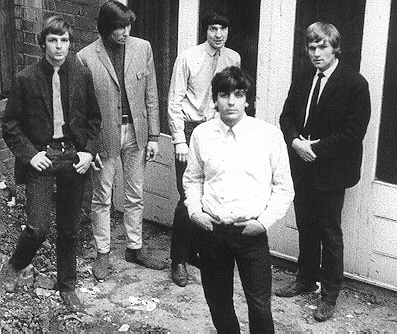 left
to right Richard Wright,Roger Waters, Nick Mason, Bob Close,
left
to right Richard Wright,Roger Waters, Nick Mason, Bob Close,
Front Syd Barrett
They went through a few name
changes such as, "The Abdabs", "The
Screaming Abdabs", "Sigma 6" and "The Meggadeaths".
In 1965,
going under the name of "The Tea Set", they were doing a gig
one night and found out that a band called "The Tea Set" were already on
the bill.
Syd then came up with a new name for the
band, "The Pink Floyd Sound"
which later became just Pink Floyd. he came up with the
name "Pink Floyd" by joining the first names of two
not well known blues musicians "Pink Anderson" and "Floyd Council"
In
1966 a new underground scene was emerging in London, and the early
floyd were performing at fringe events and small clubs.
"The
Pink Floyd Sound" began by playing cover versions of American
R&B songs in much the same vein as contemporaries The Rolling
Stones, The Yardbirds and The Kinks. they had carved out their own style
of improvised rock and roll, which drew as much from improvised jazz as
it did from British pop-rock, such as that championed by The Beatles.
Also
in that year, a new concert venue, "The UFO Club", opened in London
and quickly became a haven for British psychedelic music. They used to
perform at the UFO club (In which they later became a house band)
they're first manager seen them doing a feakout gig at the marquee. But
they were getting more popular and they were looking for a manager by
this time.
Andrew King and Peter Jenner took management
of the band near the end of
1966, and they befriended a guy call Joe Boyd
Joe Boyd
ran a place called The UFO club. he was an American music
producer, and was looking for new bands to sign.
He recalled it
was about the summer of 66 that peter and Andrews told
him of a band he wanted him to hear and gave him a demo tape. Joe was
very impressed and though they were great.
In January
1967 Boyd produced a recording session for the group at the
"Sound Techniques in Chelsea," which resulted in a "Arnold Layne" demo
Jenner and King then took the "Arnold Layne" Demo, to Recording giants
EMI. after hearing it EMI Signed Pink Floyd to they're record label.
This
was their first recording contract.
Pink Floyd Sign To EMI Records
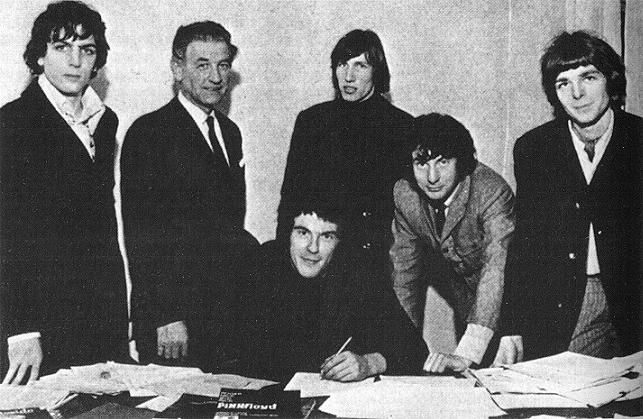
Arnold Layne It was a song about
a guy with an underwear fetish, who was
pinching underwear off washing lines in the Cambridge area!
Barrett
coined the phrase "moonshine washing line, they suit him fine"
Which
resulted in the single being banned by Radio London, for being
smutty, in it's reference to cross dressing.
The police
were involved and the underwear fetish thief, gave up his nighttime raids.
He was never caught and is possibly still going to
this day
"Arnold Layne" reached number 20 in the UK
Singles chart, by this time
their first album was finished too
Arnold Layne
Piper At The Gates Of Dawn

The band's first album, Piper At The Gates
Of Dawn, was also recorded
during this period, as were Syd's contributions (Jugband Blues) to the
second album (A Saucerful Of Secrets)
The album title
"Piper At The Gates Of Dawn" was taken from a reference
in a chapter of the children's story The Wind in the Willows. their
first three singles, '"Arnold Layne" "See Emily Play" and "Apples
and Oranges" were all written by Barrett, who also was the song writing genius behind the critically acclaimed 1967 debut album,The Piper at the
Gates of Dawn, Syd wrote eight of the songs and co-wrote another two.
The
Piper at the Gates of Dawn was recorded between January and July
1967 in Studio 2 at Abbey Road Studios, and produced by former Beatles
engineer Norman Smith.This was during same time at Abbey Road that The
Beatles were recording Sgt. Pepper's Lonely Hearts Club Band in Studio 1
and the Pretty Things were recording S.F. Sorrow. When The Piper at the
Gates of Dawn was released in August of that year it became a smash hit
in the UK, hitting No.6 on the British album charts
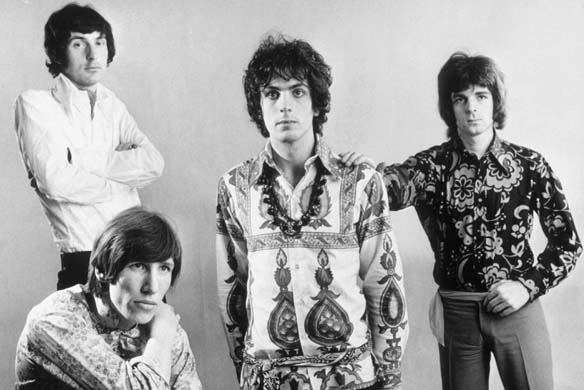 (left to right: Roger Waters, (Nick Mason back)
Syd Barrett, Richard
Wright)
(left to right: Roger Waters, (Nick Mason back)
Syd Barrett, Richard
Wright)
However, as the band began to
become well known and were getting more,
and more, popular, the mounting pressures on Barrett from the record
company, and the demands of success are thought to have contributed to
psychological problems, as well as reports of him using psychedelic
drugs mainly LSD.
The Floyd toured extensively between
1965 - 1967 in a punishing schedule
which saw them even play more than one country some evenings! Through
late 1967 and early 1968 Barrett's behavior became increasingly erratic
and unpredictable, partly as a consequence of his reported heavy use of
psychedelic drugs. Many report having seen him on stage with the group,
strumming on one chord through the entire concert, not singing, or not
playing at all.
It was also rumored that "part of the
myth of Syd Barrett relates how he
was interested in joining a sect of mid-Eastern mystics who practiced
astral travel to planets-also practiced in India - but the group felt he
was too immature to handle it. He resorted to a diet of LSD in order to
produce the effect..."
At a show at The Fillmore West
in San Francisco, during a performance of
"Interstellar Overdrive", Barrett slowly detained his guitar. The
audience seemed to enjoy such antics, unaware of the rest of the band's concern. Before a performance in late 1967, Barrett reportedly crushed
Mandrax tranquillizer tablets into an an entire tube of Brylcreem, which
he then emptied onto his head, then walked out on stage!
Under
the heat of the stage lights, the brylcreem melted down his face
under the heat of the stage lighting, apparently looking something
similar to "a guttered candle".
During their disastrous
abridged tour of the United States guitarist
David O List from The Nice was called in to substitute for Barrett on
several occasions when he was unable to perform or failed to appear. On
their return to the UK David Gilmour (a school friend of Barrett's) was
asked to join the band as a second guitarist to cover for Barrett, whose
erratic behavior prevented him from performing.
A Saucerful
of Secrets

A Saucerful of Secrets is the second studio
album by Pink Floyd. It was
recorded at EMI's Abbey Road Studios at various dates from August 1967
to April 1968. Due to Syd Barrett's declining mental state, this was to
be the last Pink Floyd album he would work on.
During
its difficult recording sessions, Barrett became increasingly
unstable and in January 1968 David Gilmour was brought in to Pink Floyd
for a handful of shows & finish the album. David played and sang
while Barrett wandered around on stage, occasionally deigning to join in
playing. As a result, A Saucerful of Secrets is the only
non-compilation Pink Floyd album on which all five band members appear,
with Gilmour appearing on four songs ("Let There Be More Light",
"Corporal Clegg", "A Saucerful of Secrets", and "See-Saw") and Barrett
on three ("Remember a Day", " "Set the Controls for the Heart of the
Sun" and "Jugband Blues").
 Front Left to right: Nick Mason, Roger Waters,
Richard Wright.
Front Left to right: Nick Mason, Roger Waters,
Richard Wright.
Back left to right: David Gilmour & Syd Barrett.
The
promotional video for the song features Barrett (shown with an
acoustic guitar for the first time) and the group miming to the song in a
more conventional stage setting, with psychedelic projections in the
background. The original audio to the promo is lost, and most versions
use the BBC recording from late 1967, consequently causing sync issues
most evident as Syd sings the opening verse. Roger Waters and Richard
Wright switch to tuba and trombone respectively in the brass-driven
instrumental break.
Barrett wanted a Salvation Army
band to play on the track. They were
brought in, but when he stated that he wanted them to simply "play
whatever they want" regardless of the rest of the group, Norman Smith
insisted on recorded parts. Eventually both versions were recorded and
used.
Because of Barrett's increasingly erratic
behavior, which reduced his
commitment to both songwriting and recording, as well as song's
distinctive three-tiered structure (all three parts are in separate keys
and in different time) some listeners believed that "Jugband Blues" was
more than likely a mash-up of three of four separate Barrett demos from
various points that the rest of the band spliced together; presumably
to create the impression that "Jugband" was a singular, stand-alone
piece. But this has proven not to be the case, and that "Jugband Blues"
was recorded how Barrett composed it.
The song is
viewed by many fans as a sad farewell piece by Barrett who,
by the beginning of the recording sessions for Saucerful of Secrets, was
already shrinking into a delirious state of mind, exacerbated by his
feelings of alienation from the rest of the band, as can be gleaned from
the painfully specific lyrics in the song
Jugband
Blues
"Jugband Blues" Lyrics
It's awfully considerate of you to think of me here
And I'm much obliged to you for making it clear
That I'm not here.
And I never knew the moon could be so big
And I never knew the moon could be so blue
And I'm grateful that you threw away my old shoes
And brought me here instead dressed in red
And I'm wondering who could be writing this song.
I don't care if the sun don't shine
And I don't care if nothing is mine
And I don't care if I'm nervous with you
I'll do my loving in the winter.
And the sea isn't green
And I love the queen
And what exactly is a dream
And what exactly is a joke.
Although it
has been argued that the common interpretation of the lyrics
as reflecting Barrett's dementia owes more to Barrett's popular image
more than fact, and that they could be read as a criticism of the other
band members for forcing him out
"Jugband Blues" is the
second song from Saucerful to appear on the
compilation album Echoes: The Best of Pink Floyd (the first being "Set
the Controls for the Heart of the Sun"). It is ordered near the end of
the second disc, immediately following "Wish You Were Here", a song
written by the rest of the band in 1975 in tribute to Barrett. Actually,
the song didn`t really fit in the structure of the band`s second
record, but they`d always planned to include at least one of Barrett`s
contributions from late 1967 as they always knew, especially after his
departure, how much they owed to him. Being the closing track then, it
really seemed to work best as Barrett`s farewell for the Floyd.
As
well as "Jugband Blues", the album was to include "Vegetable Man,"
another Syd Barrett song.
Peter Jenner called it "a
song Syd wrote describing himself as he sat at
Jenner's home. He had to go and record and, because a song was needed,
he just wrote a description of what he was wearing at the time...Many
cite it as a document of Syd's monumental breakdown as a recording
artist and as a person. Jenner wanted the song to be released on the Syd
Barrett rarities album Opel (1988), but the band blocked its inclusion.
However,
the band believed "Vegetable Man", with its autobiographical
lyrics, was unsuitable for inclusion and so it was left off the album.
The song was to appear on a single as the b-side to another unreleased
track, "Scream Thy Last Scream". Two additional Syd Barrett songs "In
The Beechwoods" and "No Title" were also recorded early in the sessions
for the album.
Keyboardist Richard Wright sings lead or
backing vocals on four of the
album's seven songs, making this the only Pink Floyd album where
Wright's vocal contributions out number those of the rest of the band.
This was also the only album to contain lead vocals by all five Pink
Floyd members (Mason sings lead parts on "Corporal Clegg").
The
unable to perform live, the band's initial plan was to keep him in
the group as a non-touring member.
Barrett had, up until then,
written the overwhelming bulk of their
material -- but this soon proved to be impractical.
But
due to his (Apparent) excessive lsd taking, erratic, and
unpredictable behavior Syd was was eventually left out the band.
Richard
wright once said: He was living with Syd at the time and would
say something like "I'm just going out to get cigarettes Syd" and would go
do gigs without telling him, leaving Rick feeling awful.
The
other band members soon tired of Barrett's antics and, in January
1968, on the way to a show at Southampton
Shall we
pick Syd Up?............ to which another voice said no, lets
just leave it.
The
Solo Years
By the start of start of 1968,
Syd pursued a solo career.
Two solo albums were to
follow, taken from various sessions recorded
between 1969 - 1971.
the first album to come out of this very
fragile period "The Madcap
Laughs" (Recorded at Abbey Road 28 May 1968 - 5 August 1969)
&
the second the self titled "Barrett" Album.
Floyd-turned-Syd
Barrett manager Peter Jenner in May 1968. Although the
sessions were brief, and they produced some fine material, the project
was abandoned for almost a year while Barrett spent much of the year as a
recluse.
The Madcap Laughs

In April 1969, Malcolm Jones
took over the project and Barrett began
working on newer material, while reworking the 1968 recordings. Session
musicians, namely, members of The Soft Machine, as well as Humble Pie
drummer Jerry Shirley were also called in to augment Barrett's songs. It
is still a mystery why Jones abandoned production responsibilities, at
the end of May, so soon after having assumed them. Jones' recollections
of the sessions are that he and Barrett got on well together and had in
fact completed half of the album before the new producers took over.
Roger Waters and David Gilmour were in the process of completing Pink
Floyd's ambitious Ummagumma album when they got involved with The Madcap
Laughs that July and helped Barrett finish his album, "in a two-day
sprint" according to Rick Sanders, author of Pink Floyd (Futura
Publications, 1976).
The album featured a rather
unorthodox recording process, in which Syd
would provide a backing track of his own singing accompanied by acoustic
guitar, over which the session musicians would overdub the rest of the
arrangement. However, Syd's playing and singing were highly erratic and
unpredictable-he skipped or added beats and bars seemingly at random, or
otherwise he would strum on a single chord for a long time before
unexpectedly reverting back to the main portion of the song. This was
all much to the frustration of the session musicians; a close listen to
several tracks [in particular "No Good Trying" and "Love You"] will
reveal the backing band hovering uncertainly here, or being caught
off-guard by a chord change there (during an interview, Robert Wyatt
recounted that musicians would ask "What key is that in, Syd?" and
Barrett would reply "Yeah", or "That's funny"). Syd would not allow the
musicians to rehearse or re-record their overdubs, insisting that they
sounded fine. After several months of intermittent recording, the album
was finally deemed complete.
"Octopus" was released as a
single in November 1969 and the album itself
followed in January 1970. It reached #40 in the UK at the time and was
fairly well-reviewed.
Barrett

(The
various fly's on the Album cover were all hand painted by Barrett
himself)
Barrett was the second and final
studio album of new material released
by Syd Barrett.
In February 1970, shortly after releasing his
first album, (The Madcap
Laughs), Barrett appeared on John Peel's Top Gear radio show where he
presented only one song from the newly released album. Two days later,
he began working on his second album in the Abbey Road Studios, this
time with Pink Floyd members David Gilmour and Richard Wright as
producers and musicians.
The main aim for the Barrett
sessions was to give Syd the structure and
focus many felt was missing during the long and unwieldy sessions for
The Madcap Laughs. Thus, the sessions were more efficiently run - with
much unreleased material recorded - and the album was finished in far
less time than it took to complete The Madcap Laughs.
Barrett
was released in November 1970 to less interest than had greeted
The Madcap Laughs earlier in the year, and as a result, failed to
chart.Syd done a few gigs in a band under the name of stars in 1972, and
some abortive recording sessions in 1974, but this wasn't very successful.
Apparently in his final gig, he seemed like
he wasn't interested, and diffident want to be there. He wasn't making much effort, and seemed
unthusiastic. the drummer at the time Gerry Shirly remembered: they were
on stage performing a song and Syd just took his guitar off, put it down
and walked out! leaving the other band members still going, they quickly bring performance to an end and walked off stage themselves
Cambridge
Barrett promptly headed back to
his hometown of Cambridge and Syd
Barrett retired from the public eye, & left his music career behind
for good, choosing to live out the remainder of his life in his mother's
house, even after her death in 1991.
Barrett still
received royalties from his work with Pink Floyd from each
compilation and some of the live albums and singles that had featured
his songs; Gilmour has commented that he himself made sure the money got
to syd all right"
Although Barrett had not appeared or
spoken in public since the
mid-1970s, time did little to diminish interest in his life and work;
reporters and fans still traveled to Cambridge to seek him out, despite
his attempts to live a quiet life. Many photos of Barrett being annoyed
by paparazzi when walking or biking, from the 1980s until his death in
2006, had been published in various media.
Apparently,
Barrett was not happy being reminded about his past as a
musician and the other members of Pink Floyd had no direct contact with
him. However, he did go to his sister's house in November 2001 to watch
the BBC Omnibus documentary made about him – reportedly he found some of
it "too noisy", enjoyed seeing Mike Leonard (of Leonard's Lodgers)
again (whom he called his 'teacher'), and enjoyed hearing "See Emily
Play" again.
Barrett, who had reverted to using his
original name of Roger, and had
returned to his original art-form of painting, creating large abstract
canvases, he reportedly wrote a book about the history of art, for his
own amusement (with no intention of publishing). He was also said to
have been an avid gardener. His main point of contact with the outside
world was his sister, Rosemary, who lived nearby. While reclusive, it
was his physical health that prompted most concern, being afflicted with
stomach ulcers and type 2 diabetes
After battling
diabetes for several years, Syd Barret sadly passed away
(peacefully) at his home in Cambridge due to complications with diabetes
on Friday 7 July 2006, he was 60 years old. The cause of death was
pancreatic cancer, but this was usually reported as "complications from
diabetes".
The occupation on his death certificate was
given as "retired musician"
He was cremated, with his ashes given
to a family member or friend.
He will live
on in the hearts & minds of his friends, family, &
many fans across the world.
Remember When You Were Young
A Young Syd playing his acoustic guitar in Cambridge
The Wish You Were Here Sessions
In 1975 during the recording sessions for
Wish You Were Here. He
attended the Abbey Road session, it was normal to have people hanging out
at recording sessions there was always people or strangers coming in unannounced.
One day one of the band members said there's
a strange guy out there
acting oddly, do you know who he is?
Someone else said i thought
he was with you or one of the others?
Eventually, they realized who he was, it was Syd!
He had become quite
overweight, had shaved off all of his hair
(including his eyebrows), he was barley recognizable.
Barrett's
behavior at the session was erratic, and he spent part of the
session jumping up and down while brushing his teeth.Roger Waters was so
distressed by the change (and strange behavior) in
his old friend, that he was brought to tears.he watched the band record
"Shine On You Crazy Diamond" - a song that
happened to be about Barrett.
Roger finally managed to
ask him what he thought of the song, and he
simply said he did not like it, and walked out of the studio.
This
would be the last time any member of Pink Floyd would ever see him
again
The Syd
Barrett & Pink Floyd Story
Part 1
Part 2
Part 3
Part
4
Part 5

click here to watch the video















